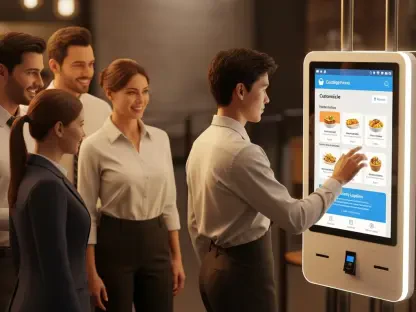The hospitality industry stands on the brink of a technological revolution, largely driven by advancements in Artificial Intelligence (AI). The introduction of revolutionary AI tools promises to enhance both hotel operations and guest experiences, ensuring that the industry keeps pace with evolving expectations and demands. By providing actionable insights and intelligent automation, AI is set to redefine the way hotels manage their operations and interact with guests.
Transforming Hotel Operations with Real-Time Insights
Democratizing Data Access
The infusion of AI into hotel operations aims to address long-standing issues related to data silos and accessibility. Historically, vital data has been confined to a limited group of analysts or executives, making it challenging for day-to-day operational teams to optimize their functions effectively. AI platforms now democratize this access by providing a conversational AI interface that allows all hotel departments to interact with data. Staff members can pose questions in plain English, and the AI system delivers intelligent insights based on real-time information, making data-driven decision-making more accessible to everyone within the organization.
Proactive Decision-Making
AI technology facilitates faster and more informed decision-making by offering real-time, predictive insights. Traditionally, hotel reporting relied on static dashboards, manual spreadsheet reviews, and weekly performance updates, leading to delayed decision-making and limited market visibility. With AI, departments can dynamically interact with their data, transitioning from passive reporting to proactive guidance. For instance, if the AI system detects a decrease in weekday occupancy, it might suggest launching a targeted marketing campaign or adjusting room rates automatically, helping hotels respond swiftly to changing market conditions. This shift empowers hotels to operate more efficiently and effectively, ultimately enhancing overall performance.
Enhancing Operational Efficiency
Integration with Existing Systems
The new AI systems are designed to integrate seamlessly with existing hotel systems like Property Management Systems (PMS), Customer Relationship Management (CRM) tools, point-of-sale (POS) systems, and channel managers. This integration creates a cohesive data ecosystem that breaks down internal silos, enabling a 360-degree view of hotel operations. By consolidating data from various sources, hotels can gain comprehensive insights that enhance operational efficiency across departments. This interconnected approach ensures that different departments can coordinate their activities more effectively, leading to smoother operations and better resource management.
Maximizing Resource Utilization
By leveraging AI-driven automation, hotels can optimize resources more effectively. Real-time information allows for accurate occupancy forecasting, smarter staff scheduling, and efficient resource management. Hotels can now anticipate guest needs proactively, reducing resource consumption and improving overall operational performance. For example, AI can predict peak check-in times, enabling hotels to allocate staff accordingly, thus reducing wait times for guests. Additionally, AI-driven predictive models that incorporate external factors like weather and local events enable hotels to make real-time pricing decisions, maximizing revenue and ensuring that rooms are always priced competitively.
Improving Guest Experiences
Personalized Guest Interactions
AI enables hotels to elevate guest satisfaction through personalized experiences. Real-time sentiment analysis and predictive insights allow hotel staff to anticipate and respond to guest needs proactively. By analyzing guest preferences and past behavior, AI can help hotels tailor their services to individual guest preferences, creating a more personalized and memorable experience. For example, if a guest frequently orders room service, the hotel can anticipate this need and offer customized dining recommendations. This level of personalization not only enhances guest satisfaction but also fosters loyalty, encouraging repeat visits.
Proactive Issue Resolution
The technology also empowers service teams to resolve issues swiftly, enhancing overall guest satisfaction. A rapid, informed response to guest concerns contributes to an improved stay experience. For instance, if a guest reports a problem with their room, the AI system can immediately alert the relevant staff and provide recommendations for resolving the issue. This swift action ensures that guest concerns are addressed promptly, reducing the likelihood of negative reviews and enhancing the overall guest experience. By leveraging AI, hotels can ensure that guests receive prompt and efficient service, leading to higher levels of satisfaction and improved brand reputation.
Case Studies and Success Stories
Pilot Implementation Results
Pilot implementations of AI platforms in select Berlin hotels have already demonstrated significant improvements, such as reduced room turnover times, increased demand forecasting accuracy, and higher upsell conversions. For example, one hotel reported a 12% reduction in room turnover times, allowing housekeeping staff to clean rooms more efficiently and making them available to guests sooner. Additionally, the AI platform enabled the hotel to achieve 8% more accurate demand forecasting, ensuring that the hotel could optimize its inventory and pricing strategies. These tangible results highlight the potential of AI to transform hotel operations and drive significant improvements in key performance metrics.
Real-World Operational Changes
Operational staff have reported that AI systems make decision-making intuitive. By reducing reliance on outdated reporting methods, hotels have seen better adjustments in staffing, pricing, and service delivery. For instance, a 20% increase in upsell conversions at the front desk was achieved by leveraging AI insights to offer personalized recommendations to guests. Furthermore, improved guest satisfaction has been noted due to quicker issue resolution, as the AI system enables staff to act swiftly on guest feedback and concerns. These real-world examples underscore the transformative impact of AI on hotel operations, demonstrating how advanced technology can drive operational excellence and enhance guest experiences.
Future Trends in Hotel Management
Strategic Roles for Hotel Staff
With AI handling data-driven tasks, hotel employees can transition into more strategic and guest-focused roles. Personalized AI briefings at the start of shifts can optimize team efficiency and guest interactions. For example, AI can provide staff with a daily overview of guest arrivals, preferences, and special requests, enabling them to tailor their services accordingly. This shift allows hotel employees to focus on creating memorable experiences for guests, rather than being bogged down by mundane tasks. As a result, hotel staff can take on more proactive roles, contributing to overall guest satisfaction and operational success.
Global Scalability and Customization
AI technology can be tailored to meet the specific needs of hotels of various sizes and in different regions, ensuring that the benefits of AI can be realized on a global scale. This flexibility allows hotels to implement AI solutions that align with their unique operational requirements and guest expectations, driving widespread adoption across the industry.
In summary, the incorporation of AI in the hospitality sector heralds a new era where efficiency and personalized service reign supreme, setting the stage for an industry that is both futuristic and guest-centric.









